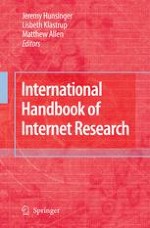2010 | OriginalPaper | Chapter
Web Search Studies: Multidisciplinary Perspectives on Web Search Engines
Author : Michael Zimmer
Published in: International Handbook of Internet Research
Publisher: Springer Netherlands
Activate our intelligent search to find suitable subject content or patents.
Select sections of text to find matching patents with Artificial Intelligence. powered by
Select sections of text to find additional relevant content using AI-assisted search. powered by
